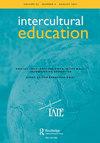Superdiversity in Israel: the relationship of religious and ethnic diversity and sense of belonging among boundary-crossing teachers
IF 0.8
Q3 EDUCATION & EDUCATIONAL RESEARCH
引用次数: 0
Abstract
ABSTRACTBoundary-crossing teachers are teachers who work in schools with different cultural characteristics than their main belonging group. Fifty-six Israeli teachers who identified themselves as religious teachers in secular schools and 41 teachers of different ethnic origin than most other teachers responded to open-ended questions in an online questionnaire. Qualitative thematic analysis revealed that social and professional connections contribute to teachers’ sense of belonging in the two groups. Teachers of different ethnic origin noted ethnic jokes and various cultural norms as contributing to a sense of otherness, while religious teachers noted the issues of religious practices and the political tensions around religion. The research sheds light on the diversity of diversity, how the sensitivities of each minority group lead to feelings of otherness while the same common good leads to a sense of belonging.KEYWORDS: Teachersreligiosityethnic originidentitydiversity Disclosure statementNo potential conflict of interest was reported by the author(s).Notes1. A Jewish holiday marking the wheat harvest and the revelation of the Torah to Moses and the Israelites at Mount Sinai.2. A set of dietary laws about the foods that Jews are permitted to eat, and how those foods must be prepared according to Jewish law.3. ‘Saturday’, the holy Jewish day of rest.4. A group of Jewish laws pertaining to conduct and outward appearance reflecting modesty and discretion.5. Jewish law and custom prescribe ritual hand washing in a number of situations, generally known by the Hebrew term (netilat yadayim).6. Homeroom teachers in schools in Israel fulfil a unique position. They are the classroom managers in charge of students’ communication with parents and with the teachers of the different subjects. They are responsible for all the social activity, and they are the primary teachers that students are supposed to turn to when they encounter any difficulty whether administrative or social-emotional.7. An institute or school for the intensive study of Hebrew for new immigrants to Israel.Additional informationNotes on contributorsShahar GindiDr. Shahar Gindi is a senior lecturer and a researcher at Beit Berl College as well as a clinical and school psychologist. He has published in different areas relating to psychology, education and program evaluation. His primary research interests are teachers' handling of Controversial Political Issues (CPI) in class and minority teachers. He heads the “Dialogue Coaching Hub” at Beit Berl college alongside Rakefet Erlich Ron.Rakefet Erlich RonRakefet Erlich Ron holds Ph.D in Sociology. Lecturer at Beit Berl Academic College. Serves as head of the Excellence Program and pedagogic instructor training teachers in the secondary school track. Rakefet teaches courses in sociology and sociology of education. Her research investigates different sociological issues in Israel including gender, interaction between cultures and their connection to society through consumerism. Her fields of research include the sociology of Israeli society, gender, cross-cultural interactions, and consumerism. She heads the “Dialogue Coaching Hub” at Beit Berl college alongside Shahar Gindi.以色列的超级多样性:宗教和种族多样性与跨界教师归属感的关系
摘要跨界教师是指在与其主要所属群体具有不同文化特征的学校中工作的教师。56名自称是世俗学校宗教教师的以色列教师和41名与大多数其他教师不同种族的教师在一份在线问卷中回答了开放式问题。定性专题分析显示,社会和职业关系有助于教师在这两个群体中的归属感。不同种族出身的教师指出,种族笑话和各种文化规范有助于产生一种异类感,而宗教教师则注意到宗教习俗和围绕宗教的政治紧张局势的问题。这项研究揭示了多样性的多样性,即每个少数群体的敏感性如何导致异类感,而同样的共同利益如何导致归属感。关键词:教师;宗教;种族;身份;西奈山犹太节日,标志着小麦的丰收和摩西和以色列人在西奈山上得到摩西五经的启示一套关于犹太人被允许吃的食物的饮食律法,以及这些食物必须如何根据犹太律法准备。“星期六”,犹太人神圣的休息日。犹太律法:关于行为和外表的一组犹太律法,反映出谦虚和谨慎犹太律法和习俗规定在许多情况下都要洗手,通常用希伯来语netilat yadayim来称呼。以色列学校的班主任发挥着独特的作用。他们是班级管理者,负责学生与家长和各科老师的沟通。他们负责所有的社会活动,他们是学生在遇到任何困难时应该求助的主要老师,无论是行政上的还是社会情感上的。希伯来学院:为以色列新移民提供希伯来语深入学习的学院或学校其他信息贡献者说明shahar GindiDr。Shahar Gindi是贝特伯尔学院的高级讲师和研究员,也是临床和学校心理学家。他在心理学、教育和项目评估等不同领域发表过文章。主要研究方向为教师对课堂政治争议问题的处理和少数民族教师。他和Rakefet Erlich Ron一起领导贝特伯尔学院的“对话指导中心”。Rakefet Erlich Ron是社会学博士。贝特伯尔学院讲师。担任卓越计划的负责人和在中学轨道上培训教师的教学讲师。Rakefet教授社会学和教育社会学课程。她的研究调查了以色列不同的社会学问题,包括性别、文化之间的互动以及通过消费主义与社会的联系。她的研究领域包括以色列社会社会学、性别、跨文化互动和消费主义。她和Shahar Gindi一起领导贝特伯尔学院的“对话指导中心”。
本文章由计算机程序翻译,如有差异,请以英文原文为准。
求助全文
约1分钟内获得全文
求助全文
来源期刊

Intercultural Education
EDUCATION & EDUCATIONAL RESEARCH-
CiteScore
2.30
自引率
8.30%
发文量
36
期刊介绍:
Intercultural Education is a global forum for the analysis of issues dealing with education in plural societies. It provides educational professionals with the knowledge and information that can assist them in contributing to the critical analysis and the implementation of intercultural education. Topics covered include: terminological issues, education and multicultural society today, intercultural communication, human rights and anti-racist education, pluralism and diversity in a democratic frame work, pluralism in post-communist and in post-colonial countries, migration and indigenous minority issues, refugee issues, language policy issues, curriculum and classroom organisation, and school development.
 求助内容:
求助内容: 应助结果提醒方式:
应助结果提醒方式:


